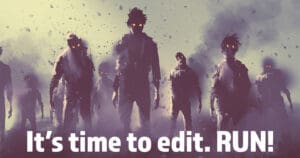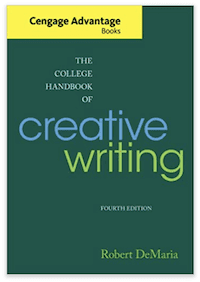An interesting thing about how SNHU handles scheduling for online students is the break structure. Each term is two months, and there are three trimesters (two-term pairs) per year (which is important to note for financial aid reasons). Students have a one-week break after every trimester (with a longer break in December). My first class was in the second half of a trimester, so I had a week off afterward. This term was the end of my first full trimester, then. No break, just dive right in.
And I could have used the break—if only to prepare myself for HIS-200.
About HIS-200
I've long thought that for a writer, a history class is an idea factory. Truth is, as they say, stranger than fiction. Historical events can lead to some excellent science fiction and fantasy—just ask George R. R. Martin, who added some dragons and a big-ass wall to the War of the Roses and created a massive hit series.
This class wasn't like that.
No, HIS-200 happens at a breakneck pace, touching on several topics each week without going into great detail about any of them. I've heard it said that a big difference between online and on-campus school is the way online courses compress a semester's worth of work into eight weeks. I felt that keenly with HIS-200.
The course was also a return for me to the MindEdge learning environment, and all I can say about that is: at least it wasn't Soomo.
My instructor was Diedre Lannon, and I'm aware I sound like a broken record when I say that she was a great instructor. That's just the way SNHU is, I guess. I have yet to encounter a bad instructor. Diedre made this class bearable; I emailed her a couple of times and her responses were pleasant and helpful.
Turnitin
HIS-200 was the class in which I learned that dealing with Turnitin isn't as complicated as it seems to be. The service doesn't understand templates, and when I turned in my first writing assignment, the Turnitin score was in the 70s (due to my inability to see old coursework, I cannot give the exact number, but I remember it being in the 70s). This is entirely down to it being a templated assignment. Concerned, I emailed Professor Lannon to ask if I could leave the templated material out of my next submission. She replied, “I know the questions, so if it feels cleaner and more organized to leave them out, feel free!” (See? She's cool.) My next submission's Turnitin score was back in my normal low range.
APA Formatting
It's required. I hate APA formatting. You'd be forgiven for thinking that because I'd only had three classes prior to HIS-200 I'd be fine with any format; after all, how could I feel strongly one way or the other? Well, I do. It sucks. I'm ride-or-die with MLA and I'm thankful that I won't have to use APA for the rest of my time in school.
I mean cover pages? WHY?
The Final Project
I chose a topic a bit off the beaten path for this type of course. Several students chose topics that were covered in class, but I wanted to challenge myself a bit. This is my thesis:
“Congress is inoperable, the filibuster is the chief cause, and until voters support Senators willing to eliminate the filibuster, Congress cannot function.”
Yeah, I hate the Senate filibuster rules.
In the End
I'm glad it's over.
Final Grade: A (99.53%)
About ENG-226
Finally, a creative writing course! ENG-123 was less about English, more about research. LIT-100 was good, but it focused on analytical reading. HUM-200 was… well, it was a thing that happened. Now, though, I'd get to be creative.
The course's title is Intro to Creative Writing, but the focus splits between the craft of writing and the proper methods of workshopping. I found them to be equally important, especially since the Fiction Writing concentration on my major means I'll be taking three additional workshopping classes (ENG-329, ENG-349, and ENG-359).
My instructor was John McIntyre, and he was great (again, broken record). John really took the time to read all the submissions and offer feedback of his own. He had some insights into my story that helped me shape the final version.
The Reading
The textbook for ENG-226 is The College Handbook of Creative Writing, 4th Edition, by Robert DeMaria. I bought the book digitally through the school bookstore, and I'm glad I did because I don't want it hanging out in my house. There are, generally speaking, two types of textbooks. One type is a book about a subject that a school or teacher decides to use as a textbook. The other is a book conceived, written, and published to be used as a textbook. The College Handbook of Creative Writing is an example of the latter. It's jam-packed with information; it's also dry, analytical, and frankly dull. The book used in ENG-329, which I'm taking as I write this, is worlds better (and it's of the first type that I described).
Advice for Incoming ENG-226 Students at SNHU
Write every day. I know, it's trite advice. Do it anyway.
Your story should focus on character development, not plot. This is true of most short stories, in fact, since the length generally prevents intricate or complicated plotting.
If you want to write science fiction, fantasy, adventure, or any other genre, do it now. When you get to ENG-329 you'll be expected to write literary fiction.
In the workshop, offer actionable feedback. Be kind, but honest. Give advice that the author can use to make changes to the story, but keep in mind that they may not heed the advice.
You will be tempted to point out spelling and grammar errors in your classmates' drafts. Don't. DON'T. Focus only on the story, not its presentation.
Be as objective as you can. The story might not work for you, but that doesn't mean the story doesn't work.
You'll be asked in the second final project prompts what your concentration is (if you have one) and if you're still happy with it. Be honest. After this you'll be getting into the degree-heavy courses. If you chose a Fiction Writing concentration but learned in this class that you're more into Poetry or Screenwriting, now's the time to think about making a change.
The Final Projects
The first final project for ENG-226 is, as I've said, a short story. Regrettably, I didn't keep the rubric for the project so I can't lay out the requirements. My final submission was eight pages long, which I think might have been over the requirement by three. I seem to remember going long on this one. Students in this class shouldn't be afraid of long submissions. I'd suggest asking the instructor if the story goes over by more than two or three, but fiction writing instructors are (or, should be!) more interested in the story than the page count.
I have plans for the story I wrote, so unlike the other classes I’ve recapped, I won’t be sharing this one.
The second final project was a reflection in week eight. Again, no rubric, but I suspect it was a 2–4 page requirement and I hit four pages. I didn't find the reflection to be difficult at all, and I doubt many students have a problem with it.
In the End
I’m satisfied with the story I submitted. I’m not in love with it, but I think it’s good. Another draft or three and perhaps I could sell it (but I think it might work as an early chapter in a book I have in mind, too).
As I write this in my sixth term, ENG-226 remains my favorite class.
Final Grade: A (99.5%)







